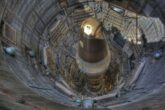March 26, 2015
Is North Korea a Nuclear State?
If the global norm against nuclear proliferation is to retain meaning, North Korea must remain isolated from the international community in certain respects. But that doesn’t mean the United States or South Korea should be allowed to conduct naïve policy and planning toward North Korea. Recognizing the threat we are dealing with on the Korean Peninsula—a nuclear-armed North Korea—is a distinct proposition from allowing North Korea to rejoin the international community.
In recent congressional testimony and in other forums, I variously described North Korea as a “virtual” and “de facto” nuclear state, as part of a larger argument about military planning. Subsequently the chairman of South Korea’s Saenuri Party—whose members control the National Assembly and the Presidency—suggested it was time for South Korea to “recognize” (“in-jeong”) North Korea as a nuclear state. This has set off a firestorm. Unfortunately, public commentary and government rhetoric has confused the difference between the multiple meanings—and implications—of “recognition.”
So why describe North Korea as a “virtual nuclear state” at all? Doesn’t that risk making North Korea’s nuclear weapons a kind of “new normal” or signal acceptance of North Korea’s nuclear program? On the contrary. The standard phrasing about North Korea’s nuclear program—that the United States will never accept North Korea as a nuclear state—removes all sense of urgency from public discourse about North Korea policy. The result is that North Korea is left to build and expand its nuclear and missile programs, moving ever closer to an assured retaliation capability. The long-term trajectory of North Korea’s nuclear program demands a sense of urgency because there’s no obvious plan in place to prevent it from achieving its aims. Refusing to acknowledge that North Korea is moving toward capabilities commensurate with a de jure nuclear state downplays the seriousness of the threat.
Read the dull op-ed at The Diplomat.
More from CNAS
-
Indo-Pacific Security / National Security Human Capital Program
Time for US nuclear strategy to embrace no first useNo first use is the most meagre of many measures needed to restrain US presidential authority in the nuclear realm....
By Van Jackson
-
Defense / National Security Human Capital Program
If You Want Peace, Prepare for Nuclear WarIn a little under three decades, nuclear weapons have gone from center stage to a sideshow in U.S. defense strategy. Since the 1990s, the United States has drastically reduced...
By Elbridge Colby
-
National Security Human Capital Program
Trump's nuclear views are terrifying: ColumnThe contours of Donald Trump’s foreign policy are becoming disturbingly clear. Newspapers have labeled his thinking on international affairs "isolationist” and “unabashedly no...
By Mira Rapp-Hooper
-
Defense / National Security Human Capital Program
Elbridge Colby before the House Armed Services Subcommittee on Strategic ForcesElbridge Colby testified before the House Armed Services Subcommittee on Strategic Forces on adapting U.S. nuclear strategy and posture to a more contested and competitive wor...
By Elbridge Colby


